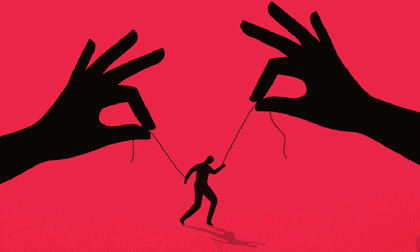Indicators of Manipulative Dynamics in Relationships
Manipulation in relationships often manifests subtly and cunningly, infiltrating your life in ways that are not easily noticeable. Identifying these manipulative tactics is essential for sustaining a healthy relationship and personal well-being. This guide outlines various manipulative behaviors, how to spot them, and approaches to address them.
1. Gaslighting
Gaslighting is a tactic of psychological manipulation where one partner causes the other to doubt their memories, perceptions, or judgements. Common phrases used in gaslighting include "You're too sensitive," "That never happened," or "You're imagining things." This behavior can severely damage self-esteem and the ability to trust one's own judgement.
How to Recognize
Frequent self-doubt, confusion about past relationship events, feeling isolated, being lied to, or having your experiences minimized are indicators of gaslighting.
2. Guilt-Tripping
Guilt-tripping is the act of inducing guilt to control or manipulate someone's actions, often expressed through statements like "After all I've done for you," or "You don't care about me."
How to Recognize
If you often feel pressured to avoid upsetting your partner, or if you act out of guilt instead of genuine desire, it may indicate guilt-tripping.
3. Silent Treatment
The silent treatment is a passive-aggressive manipulation technique where one partner deliberately ignores or refuses to communicate with the other, often as a form of punishment.
How to Recognize
If your partner routinely shuts down communication, particularly following conflicts, and uses silence as a tool of coercion, it's a sign of this manipulative method.
4. Love Bombing
Love bombing involves an excessive display of affection and attention used to exert control or influence. This can include constant messages, gifts, and compliments.
How to Recognize
If you feel overwhelmed by intense affection or it seems to be leveraged to influence your decisions, it could be love bombing. It's a red flag if this affection is inconsistent or justifies abusive behavior.
5. Isolation
Manipulators may attempt to isolate their partners from their support network by criticizing friends and family, monopolizing time, or suggesting significant changes like relocating.
How to Recognize
A diminishing social circle or feeling discouraged from interacting with loved ones can be signs of isolation efforts.
6. Economic Dominance
Economic dominance is a manipulation tactic where one partner unreasonably controls the other's finances. This involves overseeing spending habits, restricting access to financial accounts, or unilaterally making financial decisions.
How to Recognize
Feeling helpless about financial matters or regularly needing to explain expenditures may indicate financial manipulation.
7. Coercive Threats and Ultimatums
Using threats and ultimatums as a means to instill fear and enforce compliance is a manipulation strategy. It can involve threats to end the relationship, self-harm, or other forms of emotional coercion.
How to Recognize
Constantly trying to prevent negative reactions or facing frequent "do this or else" situations signals a concerning issue.
8. Excessive Reliance
Excessive reliance occurs when one partner overly depends on the other for emotional, physical, or financial support, often harming the other's independence and welfare. This includes insisting on involvement in all aspects of the partner's life and creating a sense of responsibility for their happiness.
How to Recognize
Feeling burdened by your partner's incessant demands for attention and support, to the detriment of your own life and responsibilities, is a sign of excessive reliance.
9. Blame Shifting
This behavior involves a partner consistently attributing the blame for their actions or relationship issues to the other person. Typical expressions might be "You made me do this" or "If only you hadn't done that."
How to Recognize
Frequent accusations for various problems, or feeling accountable for your partner's behavior and feelings, are signs of blame shifting.
10. Playing the Victim
In this manipulation tactic, a partner consistently presents themselves as a victim in every situation to elicit sympathy and control the other. It focuses attention on their partner's perceived failings or lack of support instead of their own actions.
How to Recognize
If your partner regularly adopts the victim role in disputes or to divert attention from their actions, it indicates manipulative behavior.
11. Sporadic Reinforcement
Sporadic reinforcement uses a mix of unpredictable rewards and penalties to foster uncertainty and dependence. This manifests as alternating periods of kindness and harshness, or affection and indifference.
How to Recognize
A relationship marked by an unpredictable mix of positive and negative interactions, causing continual uncertainty and stress, may be indicative of sporadic reinforcement.
12. Negging
"Negging" involves one partner subtly insulting or offering backhanded compliments to weaken the other's self-confidence. This tactic aims to increase emotional reliance and a desire for approval. Examples include remarks like, "You're pretty smart for someone who doesn't read much," or "I admire your indifference to your appearance."
How to Recognize
This behavior can be recognized when compliments leave you feeling belittled or insecure. A constant need to gain approval or feel adequate may indicate negging.
Effects of Manipulative Tactics
Such tactics can deeply affect one's mental state:
- Lowered Self-Esteem: Persistent criticism can diminish self-worth.
- Anxiety and Depression: Manipulative stress can lead to mental health problems.
- Dependency: Tactics like isolation can foster unhealthy dependence.
- Distrust: Experiencing manipulation can hinder trust in future relationships.
Addressing Manipulation
Acknowledging manipulative behavior is crucial:
- Recognize the Problem: Regularly evaluate your feelings and your relationship's health. Admitting the issue is essential.
- Clear Communication: If safe, discuss concerns with your partner. Specify manipulative behaviors and their impact. Avoid blame games and maintain independence.
- Set Boundaries: Clearly define acceptable behavior.
- Seek Support: Consult friends, family, or professionals for guidance and emotional support.
- Prioritize Self-Care: Focus on activities that enhance self-esteem and independence.
- Reevaluate the Relationship: Leaving may be necessary if your partner refuses to change.
Conclusion
Manipulative behavior in relationships is detrimental and can cause lasting emotional harm. Recognizing these actions is key to addressing them. Effective strategies include open communication, boundary-setting, and seeking support. Prioritize your well-being and assess the relationship's health. A healthy relationship should be based on mutual respect and understanding, not control and manipulation.



















